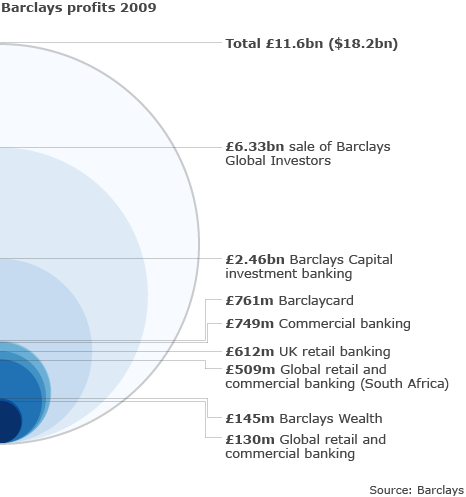
The case against nationalisation: Barclays
Today’s main story around the markets is Barclays and their results, with a stonking £11.6 billion profit for 2009:

All anticipations beforehand were that the bank would announce £10.3 to £11 billion ($16 to $17 billion) profits, so these results were fairly stupendous.
The result is also, according to CEO John Varley, justification for an average of just under £100,000 bonus to each of their 23,000 investment bankers although he and President Bob Diamond are forgoing theirs this year. £100,000 bonus is slightly less than Goldman Sachs but a good whack more than Royal Bank of Scotland, whose bonus pool has been reduced to around £1.3 billion or £60,000 each.
Barclays, and specifically Barclays Capital, have never had it so good.
Or not since 2007 anyway.
But reading through the results and reflecting on their past, there’s a few intriguing insights.
These were brought home to me by the article in the Telegraph which calls Barclays the ‘Houdini Bank’.
The article reminds me that Barclays desperately tried to buy ABN AMRO in 2007, and were well-miffed when the megalomaniacal Fred Goodwin pipped them to the post (for a valuation that was way more than the bank was worth).
They then stepped in to buy out Lehman Brothers, but were vetoed by Alistair Darling from doing so. Result: just a few weeks later, they acquired the American operations of Lehmans, the bit they really wanted as BarCap had a weak presence in the US markets, as a post-crisis gift that delivered around £2 billion profits straight to the Barclays balance sheet.
Barclays, like HBOS and RBS, was also very close to falling into the Treasury’s hands in that dreadful October week of 2008 when the crisis hit. That was until they pulled out an ace in the hand from the Middle East, via the Qatar and Abu Dhabi Sovereign Wealth Funds, who bailed them out with a £7.3 billion investment for a 32% stake in the firm.
That was no bad deal as, a year later, Qatar sold half of their stake for a 30% profit gain of £634 million.
Mind you, the Qatari Authorities must have been concerned when, just three months after their capital injection, Barclays once more almost came a cropper in January 2009 when the share shorters bombarded against them, reducing the share price to just 51 pence, from a previous high in August 2007 of over £7 a share.
Everyone thought Barclays was gonna be a gonner ... and then the Government announced the Asset Relief Scheme and they bounced back again, because this gave the market confidence they could survive, even with the billions of pounds worth of toxic assets hidden on their balance sheet.
As can be seen, this bank has been on a rock n’ rolla and perhaps could be more aptly nicknamed the Kylie Minogue Bank, as in: I should be so lucky!
All in all, the shares have stabilised around the £3 mark which, for those who got in at the low back in January 2009 at 51p per share, and sold at the high in August 2009 when the shares pipped the £3:50 mark, would have seen a seven-times multiple return on their investment. Latest analyst expectations still expect the banks’ share price to rise from today’s levels of £2.75 per share to around £4.20, so BARC is a BUY!
Since January 2009, the bank has moved onwards and upwards with some very tricky accounting schemes to siphon off £12 billion of toxic assets to the Cayman Islands, the sale of Barclays Global Investors to Blackstone, and the gain of some top investment talent from UBS and RBS.
However, all is not rosy in the Barclays pool as it is likely that the leadership tag team of John Varley and Bob Diamond will change. After seven years at the top, rumours are that Varley will finally step aside as CEO to give Diamond, the Head of BarCap, the lead role. But it may not be as simple as that.
With the Volcker plan in sight, the bank might end up splitting into two, with the Retail and Commercial Bank separating from the prop trading and investment operations of BarCap.
If this is the case, then Diamond won’t want to become a boring banker, and will stay with the big swinging investment banking masters of the universe.
Even if the Volcker plan doesn’t happen – as seems likely – there is always going to be a strong focus on narrow banking, or narrower banking, as the Treasury Select Committee has made clear. So, if I were Mr. Diamond, I’d be happy to stay just where I am.
So who are they going to call instead?
Finally, there are regular questions about Barclays risk models, capital ratios and accounting principles, no better demonstrated that the resignation of Deputy Chairman Sir Nigel Rudd last year due to an argument about asset valuations and capital reserves.
Have these arguments been resolved we wonder, or is Barclays still undervaluing and under-reserving?
We wait and see, but one thing remains clear. There’s nothing like being out of the Treasury’s pocket to enable a bank to survive and thrive.
Chris M Skinner
Chris Skinner is best known as an independent commentator on the financial markets through his blog, TheFinanser.com, as author of the bestselling book Digital Bank, and Chair of the European networking forum the Financial Services Club. He has been voted one of the most influential people in banking by The Financial Brand (as well as one of the best blogs), a FinTech Titan (Next Bank), one of the Fintech Leaders you need to follow (City AM, Deluxe and Jax Finance), as well as one of the Top 40 most influential people in financial technology by the Wall Street Journal's Financial News. To learn more click here...

